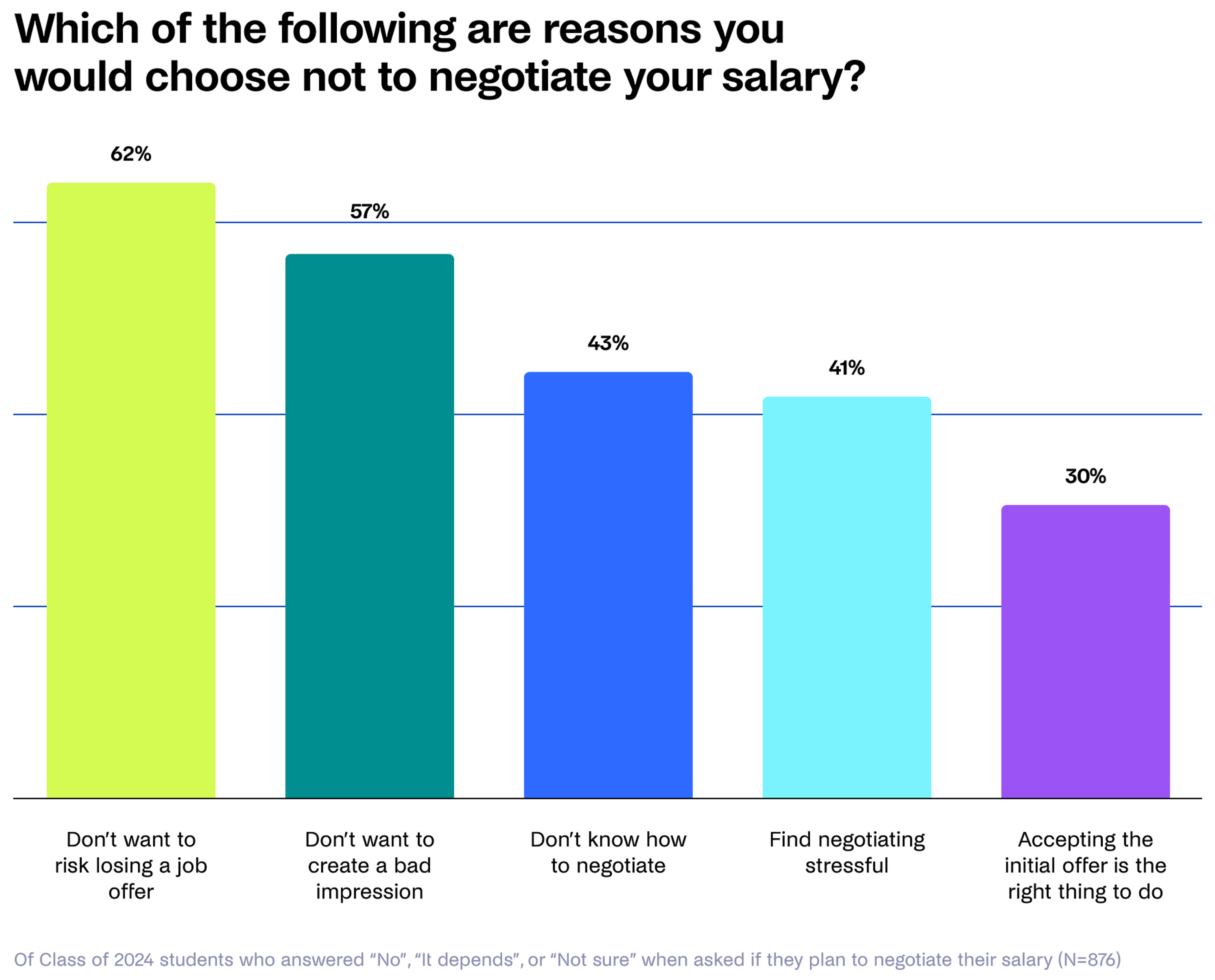If there’s one word that’s more pertinent than ever for recruiting teams today, it’s this: efficiency. You’re hustling to meet your hiring goals, all while grappling with leaner teams, slimmer budgets, and less resources.
When your recruiting team is so focused on doing more with less, having a candidate renege an offer feels like a setback.
That’s why it’s so crucial to understand exactly what students are looking for, and shape your own processes and materials around those values.
Try these strategies to reduce reneging and ensure the time, money, and effort you invest into candidates pay off.
5 strategies to reduce reneging
1. Benchmark your salary, benefits, and overall offer
You can demonstrate how your offer package is competitive throughout the recruitment and hiring process by doing things like:
- Conducting market research to confirm your salaries and benefits are competitive.
- Implementing salary transparency in your job descriptions so applicants readily understand if the range matches their expectations.
- Keeping up with benefits that the newest generation to enter the workforce are looking for from employers—like early career development, student loan relief, and mental health support.
- Incorporating information about your perks and benefits into your job descriptions and other employer branding materials.
- Being open to first time job seekers negotiating their offers.
Other offers or opportunities are far less tempting if early talent is aware that they’ll get what they want (or at least most of it) from your offer.
2. Build a solid employer brand
According to data from the National Association of Colleges and Employers (NACE), more than 40% of students say they’re more likely to decline or renege on an offer if they don’t feel a genuine connection to the employer. Build brand affinity across your recruitment marketing channels to engage candidates. For example:
- Build out your Company Profile on Handshake to create a more engaging brand experience.
- Highlight positive reviews and testimonials from current employees, interns, and recent hires in your materials.
- Offer interview tips, resume advice, and information in your events, in your messages, and throughout your relationship building.
Help candidates get to know you well before their first day—that knowledge and connection excites them to land their first job with your company.
3. Prioritize the candidate experience
A Handshake survey found the number one factor that early talent uses to evaluate a company for potential employment is how they’re treated during the interview process.* Adjust timelines and expectations with meaningful improvements like:
- Writing transparent and inclusive job descriptions so candidates don’t feel misled.
- Streamlining the application process, such as removing the cover letter requirement or preventing candidates from doing redundant work (such as re-entering all of the information that’s already on their resume).
- Shortening the interview process so talent doesn’t have to endure months of pressure and uncertainty.
- Communicating honestly and frequently throughout the process—meeting your own deadlines, following up, and being responsive.
- Giving a reasonable amount of time for the student to make a decision.
Ultimately, the best way to demonstrate that you value your employees is to value your candidates—and doing so means talent is less likely to renege on your offer.
4. Keep talent engaged between offer and start date
Many students accept an offer but still need to finish school. According to a Handshake survey, 86% of students say they’d like to remain in contact with an employer if they have a few months before they start the role.* To nurture candidates who’ve accepted offers, consider:
- Sending intentional, proactive messages to express your enthusiasm and cultivate theirs; ask if they have any questions.
- Inviting them to informational sessions, panels, and other company, new hire, or events.
- Giving them a point of contact outside of the recruiting team—like their direct manager or a team member—that they can reach out to and strike up a conversation with.
The more informed and assured a candidate feels when they sign their offer letter, the less likely they are to regret their decision and renege later.
5. Solicit feedback
Constructive criticism is never easy to hear, but soliciting feedback from candidates—including those who reneged their offer—is a surefire way to discover aspects of your experience and processes that have room for improvement.
- Ask candidates you were excited about why they reneged or rejected a job offer.
- Survey students after events and other touch points to identify where you might be falling short.
- Check out how competitors in your industry are positioning their brands to early talent—take note of the student reviews!
The more you know about what candidates truly want, the more you’re able to build an irresistible experience—and, more importantly, an irresistible job offer.
Reduce reneging, boost efficiency
While it’s easy to blame the candidate—especially ones with little to no experience going through a hiring process—it’s a lot harder to ask what your organization could’ve done differently to prevent that renege in the first place.
Committing to a first job is a big decision and early career professionals need time to weigh their options, talk to people they trust, and make a choice they feel confident in.
If you’re willing to test what works better for students and recent grads, a renege ultimately lead to a better process for the candidate—and better results for you.
Learn more about the Class of 2024 and their thoughts on salary negotiation, financial stability, and benefits in the latest Handshake Network Trends report.
*Handshake internal study, December 2022; n=1,692

